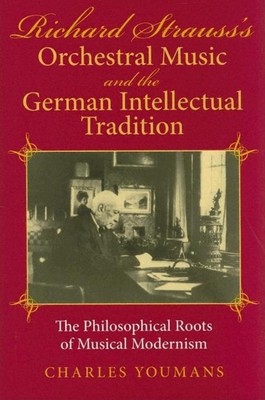
- We will send in 10–14 business days.
- Author: Charles Youmans
- Publisher: Indiana University Press
- ISBN-10: 0253345731
- ISBN-13: 9780253345738
- Format: 16.5 x 24.2 x 2.7 cm, kieti viršeliai
- Language: English
- SAVE -10% with code: EXTRA
Richard Strauss's Orchestral Music and the German Intellectual Tradition (e-book) (used book) | bookbook.eu
Reviews
Description
The young Richard Strauss was almost exclusively an orchestral composer. Yet, the year 1903 brought a significant break from orchestral writing, and Strauss then shifted his focus to opera for the next four decades. In the aftermath of the Second World War he returned to orchestral music, having first served and then been summarily dismissed by the Third Reich. Despite its enduring appeal among concert audiences, and the intriguing pattern of his compositional career, Richard Strauss's orchestral music has yet to receive the scholarly consideration it deserves.
Richard Strauss's Orchestral Music and the German Intellectual Tradition breaks new ground in Straussian studies. Youmans provides a provocative investigation of Strauss's private intellectual life and its impact on the brilliant music he created during the formation of his worldview. The composer's works have traditionally been viewed as a product of high German Romanticism, yet Youmans demonstrates that Strauss's entire body of orchestral music can be read as a history of his struggle with specific intellectual-historical concerns. Exploring the significant influences of Schopenhauer, Nietzsche, Goethe, and Wagner on the young composer, Youmans insightfully establishes that the cultural convictions and preconceptions which grounded the composer's artistic choices in fact provided him with the philosophical and musical materials that formed the basis of an early modernism. Through this grounding, the mature Strauss succeeded in opening up a new aesthetic frontier devoted to optimism, physicality, and the visual.
EXTRA 10 % discount with code: EXTRA
The promotion ends in 21d.10:46:24
The discount code is valid when purchasing from 10 €. Discounts do not stack.
- Author: Charles Youmans
- Publisher: Indiana University Press
- ISBN-10: 0253345731
- ISBN-13: 9780253345738
- Format: 16.5 x 24.2 x 2.7 cm, kieti viršeliai
- Language: English English
The young Richard Strauss was almost exclusively an orchestral composer. Yet, the year 1903 brought a significant break from orchestral writing, and Strauss then shifted his focus to opera for the next four decades. In the aftermath of the Second World War he returned to orchestral music, having first served and then been summarily dismissed by the Third Reich. Despite its enduring appeal among concert audiences, and the intriguing pattern of his compositional career, Richard Strauss's orchestral music has yet to receive the scholarly consideration it deserves.
Richard Strauss's Orchestral Music and the German Intellectual Tradition breaks new ground in Straussian studies. Youmans provides a provocative investigation of Strauss's private intellectual life and its impact on the brilliant music he created during the formation of his worldview. The composer's works have traditionally been viewed as a product of high German Romanticism, yet Youmans demonstrates that Strauss's entire body of orchestral music can be read as a history of his struggle with specific intellectual-historical concerns. Exploring the significant influences of Schopenhauer, Nietzsche, Goethe, and Wagner on the young composer, Youmans insightfully establishes that the cultural convictions and preconceptions which grounded the composer's artistic choices in fact provided him with the philosophical and musical materials that formed the basis of an early modernism. Through this grounding, the mature Strauss succeeded in opening up a new aesthetic frontier devoted to optimism, physicality, and the visual.


Reviews